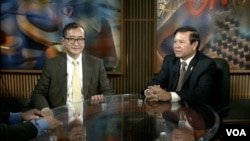WASHINGTON DC - Opposition lawmakers and supporters have threatened to boycott next year’s national elections, with opposition leader Sam Rainsy still in exile and the government refusing to reform the National Election Committee.
Sam Rainsy is facing a raft of criminal charges that he says are political, while Ministry of Interior officials said last week they will not alter the selection process for member of the NEC.
Critics say the government’s election body is biased toward the ruling Cambodian People’s Party and has failed to simplify voting regulations that would make it easier for many people to register and to vote.
National parliamentary elections are set for July 2013, but opposition leaders say they are considering not participating. Analysts say the latest move could put more pressure on the government to find a political solution to Sam Rainsy’s return.
“Based on my assumption, there would be a reconsideration on both sides—the international community and Cambodia—to do whatever can be acceptable for all,” said Chea Vannath, an independent analyst. “A mediator has not yet been found to solve the problem for [Sam Rainsy] to participate in the election.”
Sam Rainsy, who lives abroad, is facing 10 years in prison if he returns to Cambodia. He has been found guilt of a number of crimes related to his uprooting border markers in Svay Rieng province in 2009, which precludes him from running for office. He has said the charges against him are politically motivated and were handed down by a politically biased court. The Cambodian government maintains that his case remains in the hands of the court.
Sok Touch, dean of Khemarak University, said the country’s politicians have come to a point that requires negotiation. “They’ve kept it until the final round, and when they see the tension towards the solution, then they solve it.”
Whether the opposition, which has only recently united under a new party, can hold together and stand firm during a boycott, remains to be seen.
Currently, members of both old opposition groups, the Sam Rainsy and Human Rights parties, retain their parliamentary seats. If they want to join the new Cambodia National Rescue Party, they will need to eventually give up those seats. There is a chance that not everyone will, political observers say.
There is also a chance that within the rank and file of the Sam Rainsy and Human Rights parties, not everyone will cross over to the new party, leaving a fragmented opposition that could confuse voters.
An opposition delegation met with Ministry of Interior officials last week to call for a change in staffing at the NEC. The ministry, which is in charge of nominations for the committee, said it would not change the NEC’s composition.
Sam Rainsy Party spokesman Yim Sovann said Thursday the decision meant elections will not be fair, and that opposition candidates are considering not participating.
Khieu Kanharith, Minister of Information and a spokesman for the CPP, said the opposition was not likely to boycott the election. “If they do, other political parties will benefit,” he wrote in a text message.
Sam Rainsy this week will attend the Asean Inter-Parliamentary Assembly in Bali, Indonesia. Prime Minister Hun Sen and National Assembly President Heng Samrin are also expected to join that meeting, but it is unclear whether they will meet with Sam Rainsy.
Hun Sen has taken a hard line with Sam Rainsy since the opposition leader began criticizing his border policies with Vietnam. He has said Sam Rainsy’s case is a matter for the courts and that no political settlement is possible.
Meanwhile, the UN’s special envoy to Cambodia for human rights, Surya Subedi, has said Sam Rainsy should be allowed to return to lead the opposition for the upcoming elections.
Chea Vannath said the international community has an interest in seeing “sustainable democracy” in Cambodia, especially to produce economic development.
Similarly, Sok Touch said the absence of Sam Rainsy in the 2013 elections will likely bring pressure from the West and could affect bilateral agreements, particularly in the garment industry, whose major export markets are the US and Europe.
If Cambodia is embargoed for garment exports, that could create a “garment sector crisis,” he said. “This is an important issue that we anticipate if the opposition does not join [the elections].”
Keo Phalla, a member of the NEC’s legal department, said the election is moving forward as planned, on July 28, 2013. “The participation of a party or not, the NEC does not think about this issue,” he said.
Puthea Hang, executive director of the Neutral and Impartial Committee for Free and Fair Elections, said that in a truly democratic system, elections should be contested by an opposition.
“If there is a main opposition party that does not participate in the election, it is an indication that the openness to having democracy is not wide at all,” he said.
Cambodia has faced political deadlocks in the past. Typically, those are resolved in the 11th hour, after pressure from constituents and politicians alike combines with pressure from abroad. Past exiled politicians have been able to return to their political careers, after rounds of negotiations and concessions.
Opposition Considers Boycott of National Elections
- Sok Khemara
- VOA Khmer

National parliamentary elections are set for July 2013, but opposition leaders say they are considering not participating.






